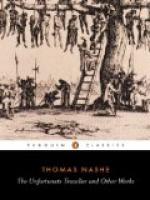|
This section contains 6,418 words (approx. 22 pages at 300 words per page) |

|
SOURCE: "Wits Wantonness: The Unfortunate Traveller as Picaresque," in Studies in Philology, Vol. 73, No. 4, October, 1976, pp. 393-413.
In the following essay, Gohlke analyzes Nashe's use of the picaresque in The Unfortunate Traveller to resolve a conflict between rhetorical cleverness and the need for moral action in the novel's tone.
I
Close to death, Jack Wilton, in the middle of The Unfortunate Traveller, composes a ballad which he calls "Wiltons Wantonnesse."1 The half-serious, half-comic title of this ballad echoes one of the most haunting stanzas from Nashe's "Litany in Time of Plague" in Summers Last Will and Testament.
Wit with his wantonnesse
Tasteth deaths bitternesse:
Hels executioner
Hath no eares for to heare
What vaine art can reply.
I am sick, I must dye:
Lord haue mercy on us.2
Jack's ballad, which summarizes his career until the point of his near-hanging, and Nashe's somber lyric both find a point...
|
This section contains 6,418 words (approx. 22 pages at 300 words per page) |

|


